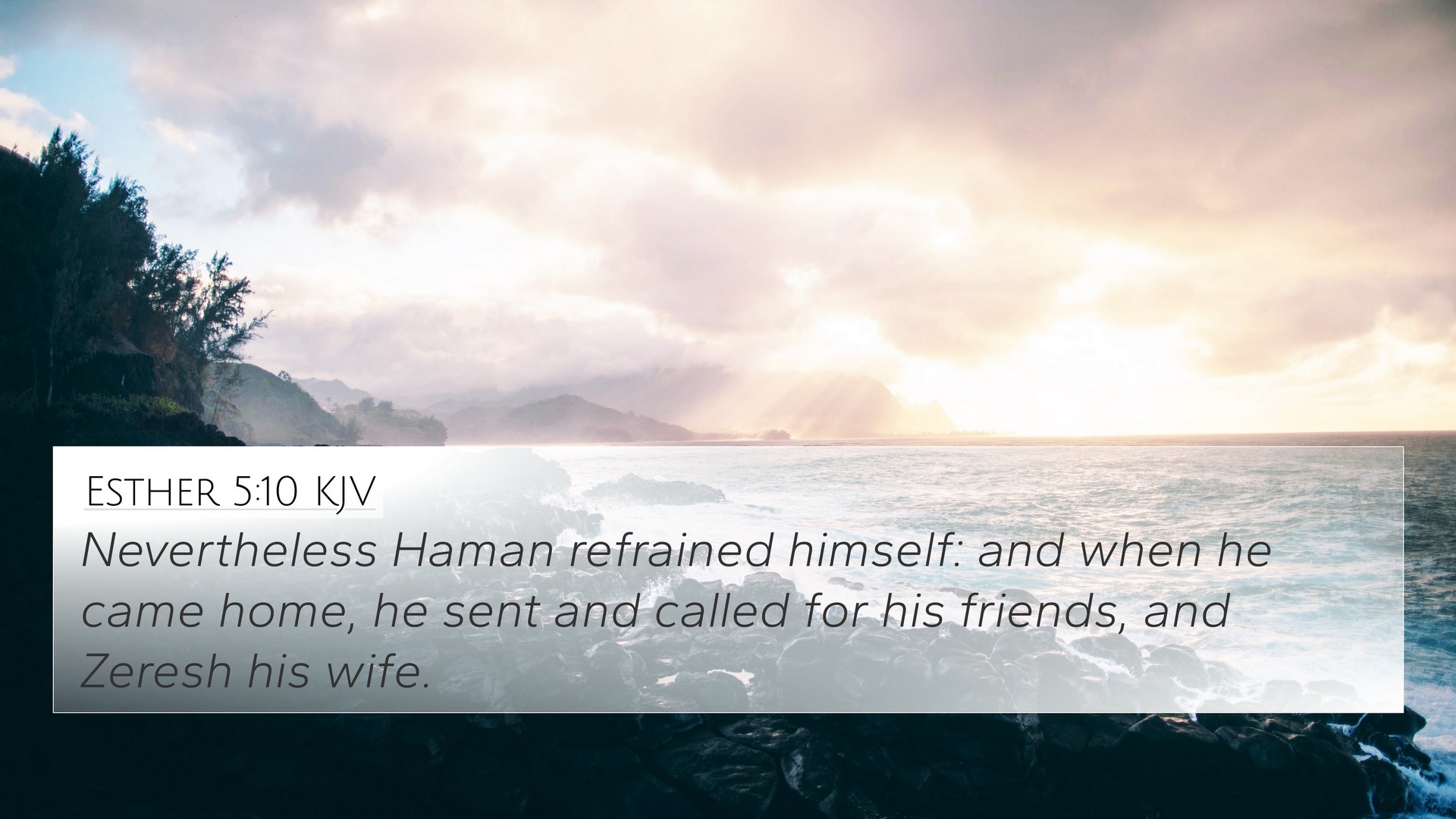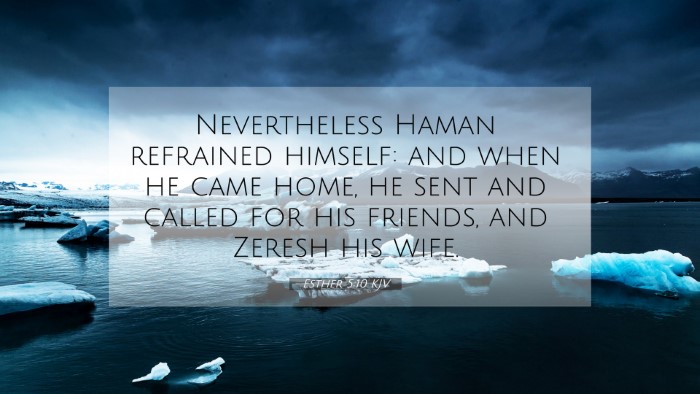Old Testament
Genesis Exodus Leviticus Numbers Deuteronomy Joshua Judges Ruth 1 Samuel 2 Samuel 1 Kings 2 Kings 1 Chronicles 2 Chronicles Ezra Nehemiah Esther Job Psalms Proverbs Ecclesiastes Song of Solomon Isaiah Jeremiah Lamentations Ezekiel Daniel Hosea Joel Amos Obadiah Jonah Micah Nahum Habakkuk Zephaniah Haggai Zechariah MalachiEsther 5:10 Similar Verses
Esther 5:10 Cross References
Nevertheless Haman refrained himself: and when he came home, he sent and called for his friends, and Zeresh his wife.
Uncover the Rich Themes and Topics of This Bible Verse
Listed below are the Bible themes associated with Esther 5:10. We invite you to explore each theme to gain deeper insights into the Scriptures.
Esther 5:10 Cross Reference Verses
This section features a detailed cross-reference designed to enrich your understanding of the Scriptures. Below, you will find carefully selected verses that echo the themes and teachings related to Esther 5:10 KJV. Click on any image to explore detailed analyses of related Bible verses and uncover deeper theological insights.

Esther 6:13 (KJV) »
And Haman told Zeresh his wife and all his friends every thing that had befallen him. Then said his wise men and Zeresh his wife unto him, If Mordecai be of the seed of the Jews, before whom thou hast begun to fall, thou shalt not prevail against him, but shalt surely fall before him.
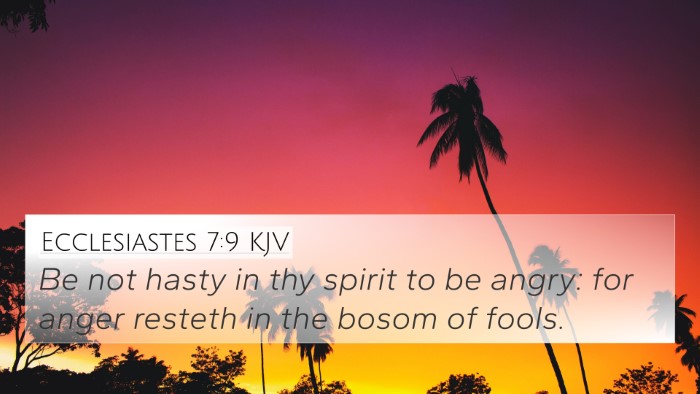
Ecclesiastes 7:9 (KJV) »
Be not hasty in thy spirit to be angry: for anger resteth in the bosom of fools.
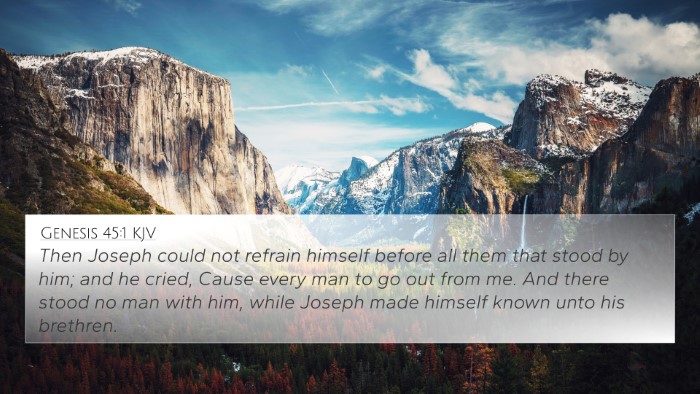
Genesis 45:1 (KJV) »
Then Joseph could not refrain himself before all them that stood by him; and he cried, Cause every man to go out from me. And there stood no man with him, while Joseph made himself known unto his brethren.
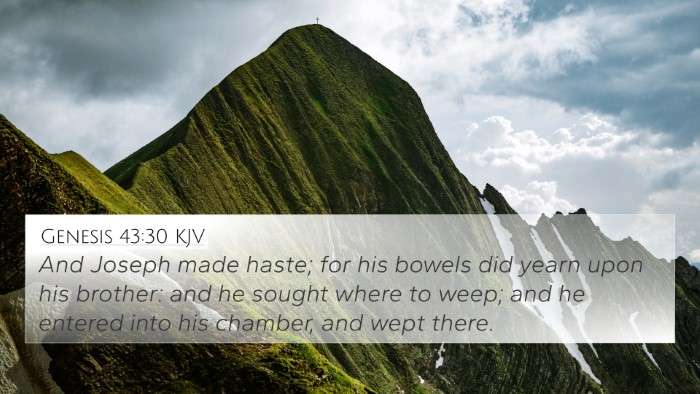
Genesis 43:30 (KJV) »
And Joseph made haste; for his bowels did yearn upon his brother: and he sought where to weep; and he entered into his chamber, and wept there.

2 Samuel 13:22 (KJV) »
And Absalom spake unto his brother Amnon neither good nor bad: for Absalom hated Amnon, because he had forced his sister Tamar.
Esther 5:10 Verse Analysis and Similar Verses
Understanding Esther 5:10
Esther 5:10 states: "Nevertheless Haman refrained himself: and when he came home, he sent and called for his friends, and Zeresh his wife." This verse highlights Haman's internal struggle and his dependence on his friends and family for support in the face of his growing resentment toward Mordecai and the Jewish people. In examining this verse, we can draw on insights from several public domain commentaries.
Insights from Matthew Henry's Commentary
Matthew Henry remarks on Haman’s character as a man of pride and ambition who, despite his high position, is deeply affected by Mordecai’s refusal to bow to him. Haman’s decision to refrain from expressing his anger at the moment suggests a hint of self-control, which could be interpreted as a façade of composure. Yet, his subsequent actions indicate that he seeks validation and sympathy from those around him.
Albert Barnes' Commentary Insights
Albert Barnes emphasizes the importance of Haman's response to his perceived slight. Instead of confronting Mordecai directly, Haman chooses to express his frustrations to those close to him. This reflects his insecurity and need for affirmation. Additionally, Barnes highlights that this episode showcases the themes of pride and the eventual downfall of those who oppose the Lord's anointed, suggesting the narrative foreshadows Haman’s doom.
Adam Clarke's Commentary Perspective
Adam Clarke provides a detailed analysis of Haman’s actions, stating that his inclination to share his woes with his wife and friends reveals his vulnerability despite his powerful status. Clarke suggests that Haman’s reliance on his household implies a lack of true strength and understanding, as he cannot find solace in his accomplishments alone and seeks external validation.
Biblical Cross-References
This verse intersects with several significant biblical themes and passages:
- Proverbs 16:18: "Pride goes before destruction, and a haughty spirit before a fall." This emphasizes the destructive nature of pride, a key trait of Haman.
- Esther 6:12: "And Haman told Zeresh his wife and all his friends everything that had befallen him." This shows the continuous dialogue between Haman and his wife, who ultimately influence him.
- James 4:6: "God resists the proud, but gives grace to the humble." This serves as a reminder of God's opposition to those who elevate themselves above others.
- Please note: Further references may vary based on different biblical interpretations and versions, but other potential verses could include:
- Philippians 2:3: "Let nothing be done through strife or vainglory; but in lowliness of mind let each esteem other better than themselves."
- Proverbs 13:10: "Only by pride cometh contention: but with the well advised is wisdom."
- Mordecai's refusal to bow: Esther 3:2. Establishes the conflict leading to Haman's reaction in Esther 5:10.
- Ecclesiastes 4:9-10: "Two are better than one; because they have a good reward for their labor.... Woe to him that is alone when he falls." Highlights Haman's need for companionship.
- Job 30:22: "Thou liftest me up to the wind; thou causest me to ride upon it, and dissolvest my substance." Echoes the theme of feeling neglected and alone despite one's positioning.
- Matthew 23:12: "And whosoever shall exalt himself shall be abased; and he that shall humble himself shall be exalted." A fundamental biblical principle relevant to Haman’s narrative.
Connections to Broader Themes
Esther 5:10 serves as a link to several broader biblical themes like personal ambition, pride, and the eventual divine justice that underlies the book of Esther. The connections between Esther’s narrative and other scriptural texts underscore the important lesson about humility and the consequences of pride.
The Importance of Community
Another aspect illustrated by Haman's action is the importance of community rejection and acceptance. His reliance on friends and family to share burdens highlights the human need for companionship and validation. This connection resonates with many verses discussing the fellowship of believers and the support systems established within communities of faith.
Conclusion
Esther 5:10 encapsulates many vital themes that transcend its narrative context. By examining the verse through the commentaries of Matthew Henry, Albert Barnes, and Adam Clarke, we see the multi-faceted character of Haman and the implications of pride and social interaction. As we explore biblical cross-references, we can better understand how different scriptures interact with and illuminate one another, creating a tapestry of connections that enrich our spiritual understanding.
